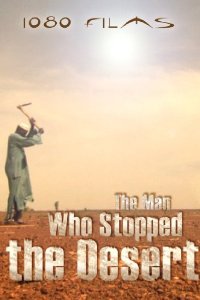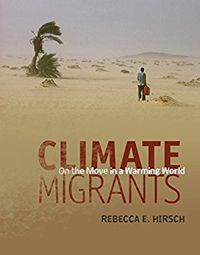For Sunday July 23, 2017
Lectionary Readings (Revised Common Lectionary, Year A)
Genesis 28:10–19, Wisdom of Solomon 12:13, 16–19, or Isaiah 44:6–8
Psalm 139:1–12, 23–24, or Psalm 86:11–17
Romans 8:12–25
Matthew 13:24–30, 36–43
With the withdrawal of the United States from the Paris Climate Agreement, the epistle for this week challenges the church to renew its care for creation. Where is the church on these complicated questions? What does our Christian story contribute to the discussion?
In Romans 8, Paul moves from the personal to the global. Last week he contrasted individual life "in the flesh" versus "in the Spirit." This week he widens his lens to consider "the whole creation" (Romans 8:22). And in Romans 8, the whole creation struggles — with "anxious longing," "subjection to futility," "slavery to corruption," and the "groans of childbirth."
In Alaska, entire islands are vanishing because of the melting permafrost and perennial sea ice. The tiny village-island of Kivalina — just two square miles of land, situated 130 miles above the Arctic Circle, is populated by the Inupiaq Eskimo tribe. Their ancient way of life is threatened because water is overtaking the land.
By some estimates, coastal erosion and rising sea levels mean that Kivalina will be completely submerged by the year 2025. Already there are federal, state, and local studies about the alternatives for their compulsory relocation. The costs are projected at $100 million.
Some of the thirty-three tiny islands of the central Pacific nation of Kiribati are already completely submerged under rising sea levels. On other islands, the farm land and drinking water have been poisoned by sea water. In the next 25 years, 40–50 island nations will totally disappear.
The Sahel desert of north-central Africa is home to 100 million people, but droughts, famine, and violence have already displaced 2.8 million people.
 |
|
Yacouba Sawadogo makes a difference.
|
Here in the continental United States, professor Hal Wanless of the University of Miami says that he "cannot envision southeastern Florida having many people at the end of the century." In an article called "Miami is Flooding," Wanless explains the consequences of climate change for one of our biggest cities (The New Yorker, December 21, 2015).
One of the many consequences of climate change is the forced relocation of millions of people. By the year 2050, writes Rebecca Hirsch in her book Climate Migrants: On the Move in a Warming World (2017), some 25 million people will become involuntary migrants due to climate changes. Their homes and lands will be uninhabitable.
These involuntary migrations raise all sorts of questions about national security, cost-sharing, resettlement programs, etc. In New Zealand in 2014, a family from the island nation of Tuvalu was granted asylum as "climate refugees." The hardest hit peoples are often the poorest, who in many instances have contributed the least to climate change.
I appreciated reading the recent book by Pope Francis, Laudato Si': On Care for Our Common Home (2015). This second encyclical by Francis takes its title from The Canticle of the Creatures by his namesake Francis of Assisi, who wrote, "Laudato Si', mi' Signore —" Praise to you, my Lord, through our Sister, Mother Earth, who sustains and governs us, and who produces various fruit with colored flowers and herbs."
Our "sister" now cries out to us because of the violence we have done to her in our "irresponsible use and abuse of the goods with which God has endowed her." By now the list is long and well known — climate change, depletion of non-renewable resources, the loss of biodiversity, and a growing gap between the minority rich who are addicted to "compulsive consumerism," and the poor, who can't possibly consume like we do, even were it possible. Our current situation cannot be universalized or sustained.
We've succumbed to the "modern myth of unlimited material progress," to the alluring power of the "technocratic paradigm," the numbing of conscience, and an economic model that maximizes profits without any greater end in view. By now we ought to know that technological progress and economic growth do not guarantee human welfare.
What we need most is a change in our own selves. That begins, says Pope Francis, with realizing that "humanity is one people living in a common home." "It cannot be emphasized enough how everything is interconnected."
We can no longer make choices or policies that defend the interests of only a few countries, or even the few within a single country. "We need to strengthen the conviction," he says, "that we are one single human family." The earth is our "collective good." Indeed, "this sense of fraternity excludes nothing and no one."
 |
|
On the move in a warming world.
|
Pope Francis addresses his encyclical to "all people of good will," but he has special counsel for Christians. What we need is an "ecological conversion," whereby "the effects of our encounter with Jesus Christ become evident in our relationship with the world around us. Living our vocation to be protectors of God's handiwork is essential to a life of virtue; it is not an optional or a secondary aspect of our Christian experience." (my emphasis).
For one inspiring story, consider the film from Burkina Faso called The Man Who Stopped the Desert (2010). Yacouba Sawadogo is an illiterate farmer in the west African country of Burkina Faso. He's done more to reverse the ravages of drought and desertification than all the money and expertise of western aid and agencies. So says the Dutch scientist Chris Reij, who has helped Sawadogo for twenty-five years.
His simple methods have turned fifty acres of harsh desert into lush forests. First, he digs "Zai holes" or pits that are bigger and deeper than normal, and fills them with manure. The holes help capture the rain. Next, simple lines of small stones on the hard, baked land slow down the rain run-off and help it soak into the ground.
Sawadogo has faced opposition from "land chiefs" because he's going against traditional practices, and from the government's plan for urban expansion. Still, his techniques have impacted the social, cultural, economic, and environmental aspects of his community. They now enjoy "food sovereignty" even in years of little rain.
For further reflection, see the following JwJ reviews:
Jared Diamond, Collapse; How Societies Choose to Fail or Succeed (New York: Viking, 2005), 576pp.
Tim Flannery, The Weather Makers; How Man is Changing the Climate and What It Means for Life on Earth (New York: Atlantic Monthly Press, 2005), 357pp.
Pope Francis, Laudato Si': On Care for Our Common Home (Huntington, IN: Our Sunday Visitor Publishing Division, 2015), 176pp.
Rebecca E. Hirsch, Climate Migrants: On the Move in a Warming World (Minneapolis: Twenty-First Century Books, 2017), 88pp.
Woodeene Koenig-Bricker, Ten Commandments for the Environment; Pope Benedict XVI Speaks Out for Creation and Justice (Notre Dame, Indiana: Ave Maria Press, 2009), 152pp.
Elizabeth Kolbert, The Sixth Extinction; An Unnatural History (New York: Henry Holt, 2014), 319pp.
Peter Rogers and Susan Leal, Running Out of Water: The Looming Crisis and Solutions to Conserve Our Most Precious Resource (New York: Palgrave Macmillan, 2010), 245pp.
Bill McKibben, Eaarth; Making a Life on a Tough New Planet (New York: Times Books, 2010), 253pp.
Bill McKibben, Oil and Honey; The Education of an Unlikely Activist (New York: Times Books, 2013), 255pp.
E.O. Wilson, The Creation; An Appeal to Save Life on Earth (New York: W.W. Norton, 2006), 175pp.





